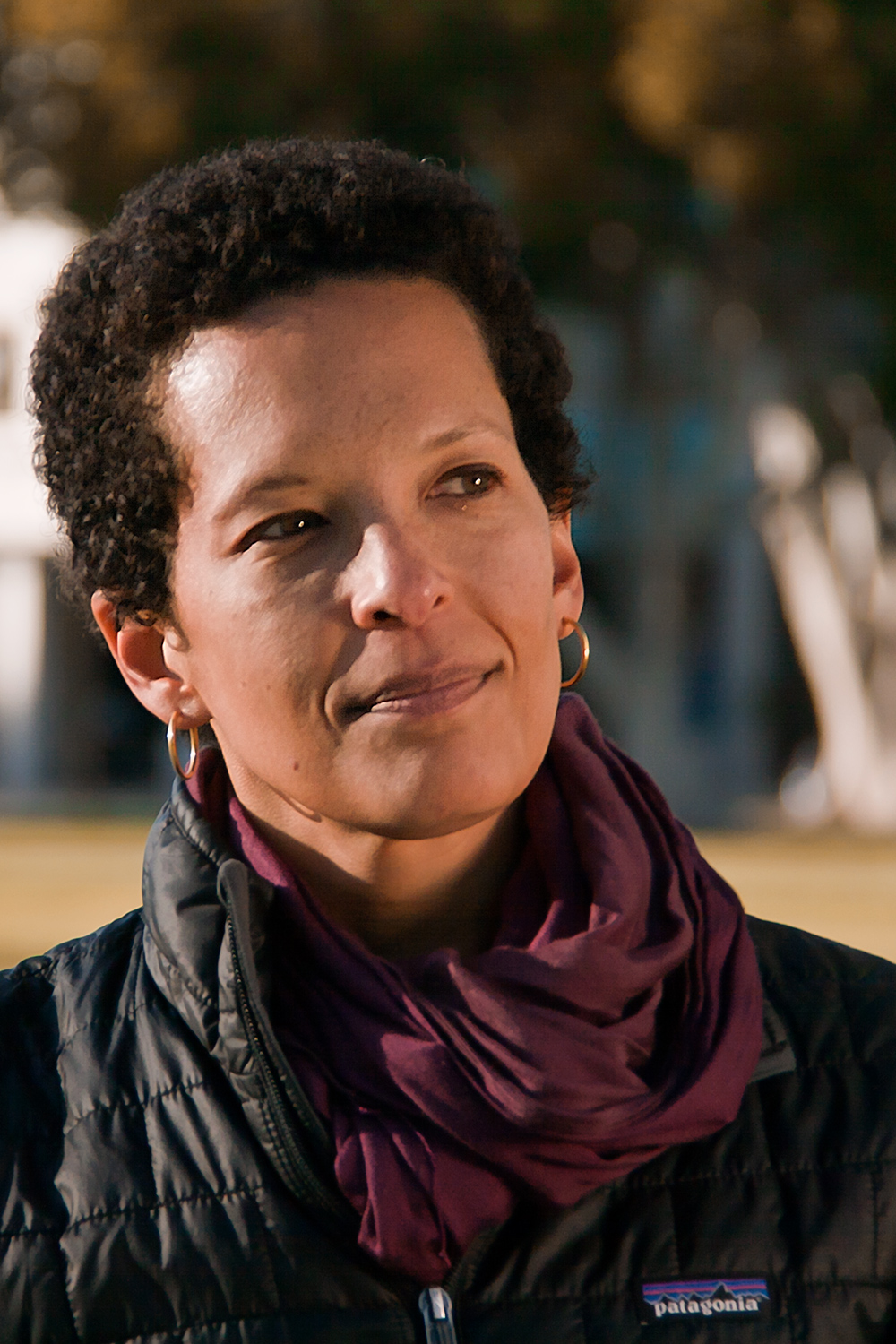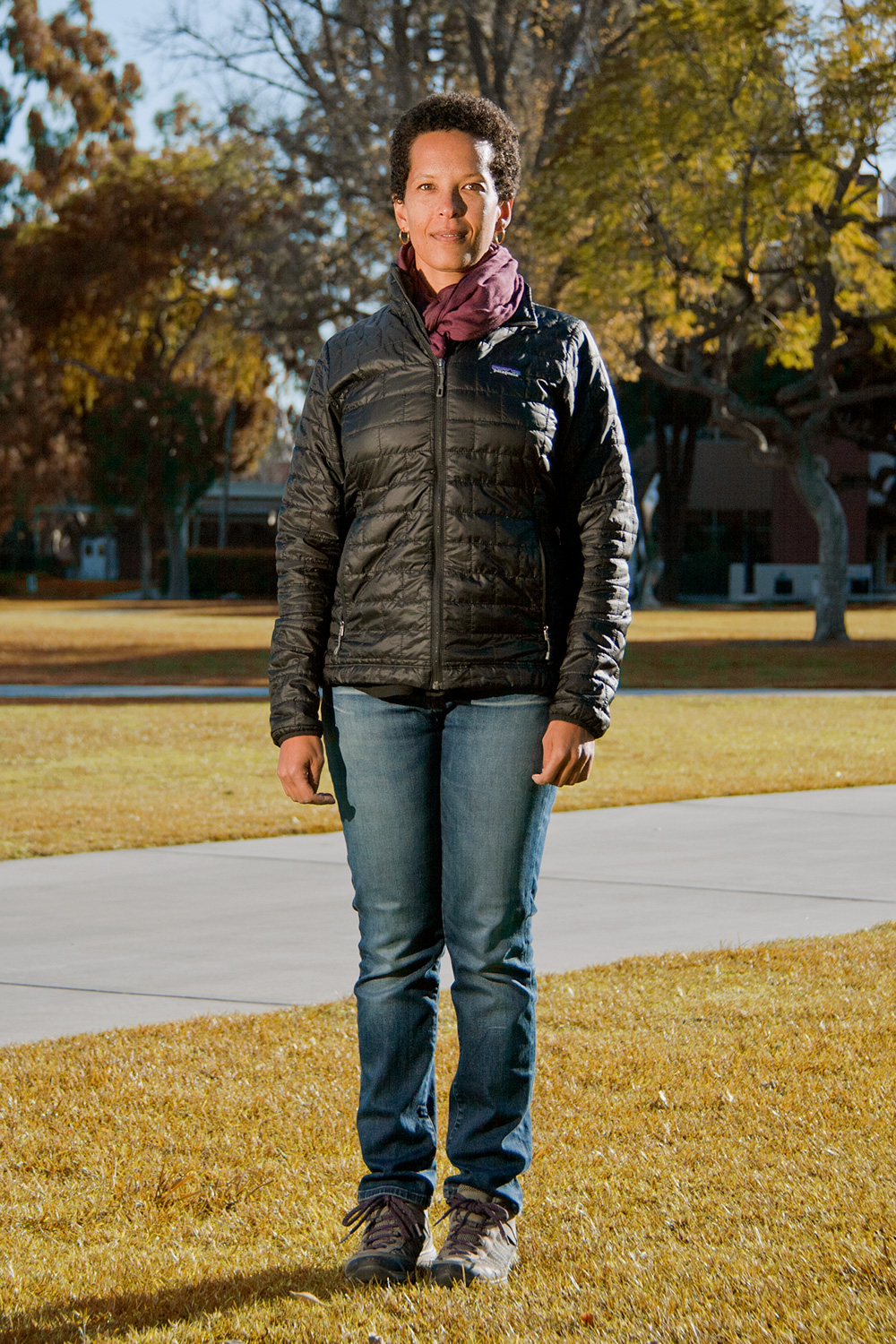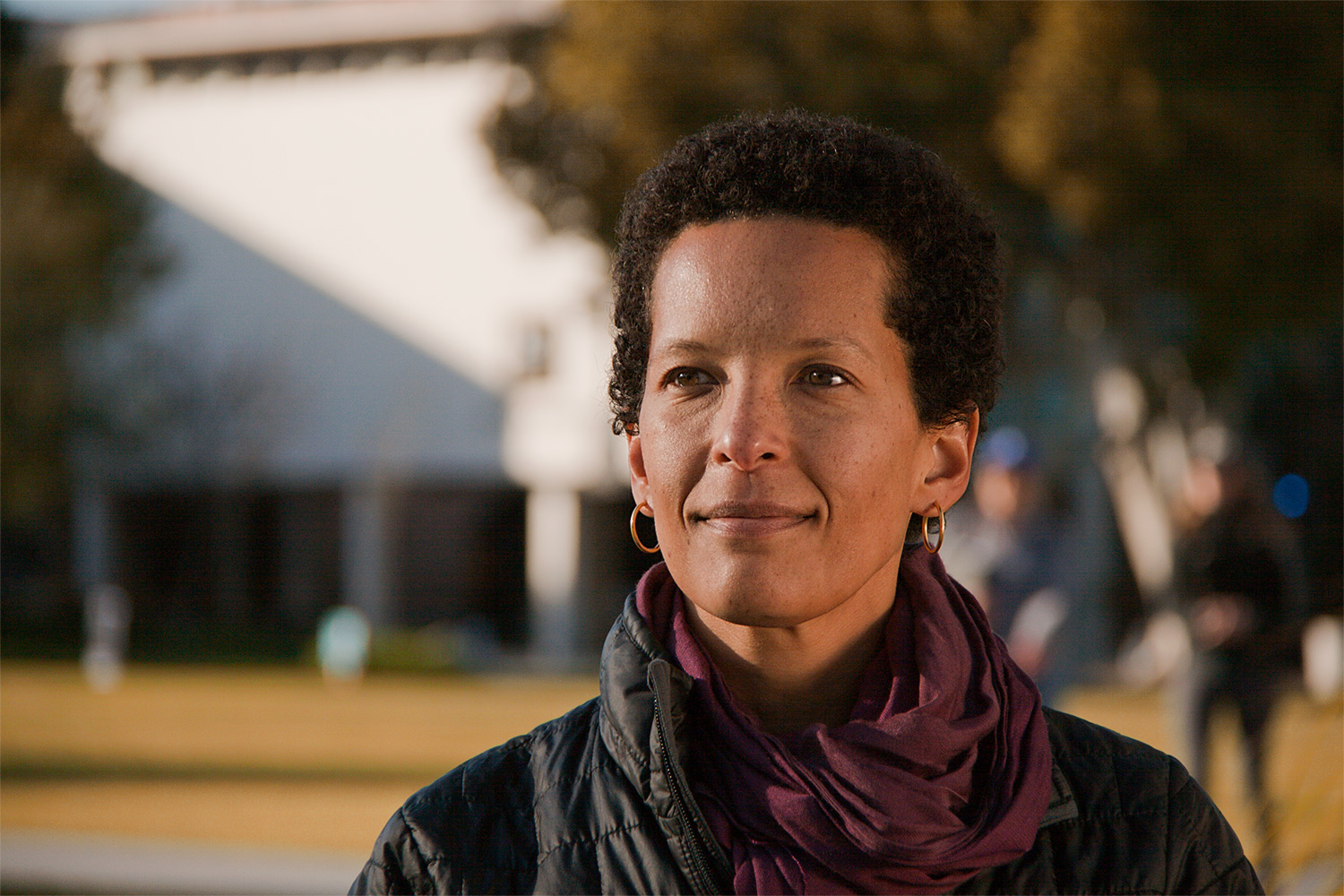- Article № 004
- March 2018
WANJIRU MARGARET NJUGUNA
- sedimentology

Have you always known that you would be in this field?
No, actually, not at all. I knew that I liked the outdoors. I had watched my mother teach and give lectures on the geology and physical geography of East Africa. I had actually gone on her field trips. She taught for many years at a university in Nairobi, Kenya; and then later on in Upstate New York when we moved there when I was in high school. Mum came to Kenya to do her fieldwork, from England. So that's how she ended up there.
Fieldwork, meaning…
… Doing research on diatoms in lakes.
Oh. She’s a geologist?
Well, she's retired now. But, yeah. So, she finished her fieldwork there, went back to England, and then came back to Kenya to teach. She would take students out in huge buses to different places and I would trail along and be like, “Dang! She's in charge of all these people!” You know, just super proud. And she used to do talks for the Kenya Museum Society with projectors—back then it was slide projectors, right? I remember her putting slides in the carousel, and then, “Lights off. Enjoy!” So that part was super cool. And guess who was often a person for scale? My sister and I definitely made appearances in those slides. [laughter] I remember our house in Kenya had crates of rocks, and minerals, and little vials of acid. And they were in the oddest of places. And I remember being really embarrassed, and being like, “You know, mom, like, um, my friends’ houses don't look like this.” To this day she still brings that up. [laughter] So that was my relationship with that. [laughter] But I always enjoyed it.
Did she steer you towards geology?
Ah, No. Mom was very, very hands-off. But, she encouraged everything. We did fun stuff. She knew I liked the outdoors and I that I was active. So, we did horseback riding together, which was really a treat. We read a lot of books together, so I was really into reading.
So what were your formative years like then?
Well, they were all spent in Nairobi, Kenya. Going to an all-girls Catholic school. Uniforms, of course. You know… red sweater. White shirt. White blouse. Navy blue pleated skirt. White sox. Black shoes. Old English nuns. I swam competitively. That was a big thing. Yeah. I was a swimmer. I mean, that was my serious thing. I swam international competitions representing Kenya. So, I was training and going to school. Playing piano. Singing with the church choir.
But, when I moved to the United States and I went to Tufts, back East, I was really into languages. That's something that was really key. Because in Kenya, you know, we speak Kiswahili, the national language, as well as English. But then we also have different tribes—many different tribes. So I also grew up speaking Kikuyu with my grandparents and other family members who didn't speak Kiswahili that well. I really liked languages. I'm still pretty good at them—I kind of just pick them up. I really fell in love with Spanish. I took Spanish in high school, immediately, and really wanted to do a study abroad. I did eventually do a study abroad in college, but I wanted to do it in high school too. So, I [eventually] went to Ecuador to study Spanish and live with a homestay family. But, I was also really interested in the history of music, so I took The Music of Spain and Portugal. It was more Spain- and -Portugal-type guitar music. Not playing, but just… it was cool to learn about these things.
How was Tufts? In addition to language and music, is that where you found geology?
Tufts was good. It was definitely not where I gained my academic stride. I mean, I was kind of meandering. I was very happy I went to Tufts, and really emotionally grew there. But, I hadn't really decided [on a major]. I liked everything, you know. So it was only actually my junior year that I went into the geology department and was like, “Oh my God, there are the trays! The trays of rocks!” And I was literally like, “Here! Where do I drop my bag? I've arrived! I'm home!” And I remember my advisor, Anne Gardulski—amazing woman—she was like, “Ummm... So, you're going to have to do a lot of catching up,” because I had basically just been sampling [classes] for quite a bit. So the next two years were, you know, “You have to take this, and it has a lab… And, you have to take this, and it has a lab.” And I was just like, “All right, let's do this.” And it was really, really cool.
They had this winter geology program where we went to Arizona, New Mexico, and Texas. And that was my first time going to the west coast as an adult. And it blew my mind. It was like, “Oh, okay. Okay, Okay. Okay. Okay. Okay. So yeah, if you remove all the covering, you know, the vegetation and the glacial deposits, you can actually see structure.” And when I saw the Grand Canyon for the first time... I mean... there's a reason why people are just blown away by it. It's incredibly impressive to be able to walk through it. We hiked down to Phantom Ranch and spent some time there, and I just remember being like, “Oh wow!” And I remember seeing the Petrified Forest. That part was amazing as well. It was a really good trip. West Coast geology is very phenomenal and special in its own way. East Coast geology—[also] very special in its own way.
How was your transition from Kenya to the East Coast?
Transitioning from life in Kenya to life in Upstate New York was really tough. And for many years, I felt like I was grappling with culture shock. I truly hadn't settled in within myself at all. Yeah, Upstate New York was tough. My mom was teaching at a small, liberal arts [university]. Small town. Like, 2,000 people, right? But then 4,000 when the students are in session. The meeting spot was either the bagelry or the Dairy Queen—it's like that. But, I had a very supportive group of friends that I went to high school with. Actually, one of my nearest and dearest friends whose parents were also teaching at the university, he also appreciated the outdoors—we liked similar things. So summertime, we were walking outdoors. And, we would go swimming in Grasse River. We were close to the Adirondack Mountains, so we would go hiking. We went on really cool, beautiful canoe trips. Rope swings, and campfires, and drinking beer, and illicit nooks by the river bend. You know, fun stuff like that. So in that regard, it was actually very picturesque and beautiful. I remember my summers in Upstate New York so fondly. Like it's just a beautiful time. So, that part was good.
But, there are some, you know… narrow minded people. Being a woman of color, POC, I definitely didn't see a lot of people who looked like me. Sometimes, I definitely felt like, “Okay… I'm not from here. I'm from there.” And there's the feeling of not belonging or being comfortable. And as a teenager, you know, you're so sensitive anyway...
... Just as a baseline.
Just as a baseline. But, I had really supportive professors at Tufts. Really, really nurturing environment, which I needed in many ways. I had a really good guidance counselor. Gosh, yeah… He was so good. He was just like, “Yeah... you're going to Tufts. We're going to get you out of here... I mean nothing against Canton; but, you need to go to Boston.”
He's reminding you that you were in a small place where there are small minds.
Yeah. And he was very encouraging.


Did you find similar narrow mindedness within the geology department at Tufts?
Not narrow mindedness, just this... I mean, the common theme is [that] there are so few people who look like me, you know, in every aspect. I mean, at Tufts, for sure. We did have one woman, Anne Gardulski, who was a professor and department chair for a while. Really phenomenal woman. But not a whole lot of POCs… at all.
They were either white men or white women?
Yup. Yup. All my friends were white guys, white girls. And, it was a small department. Yeah. All white guys, white girls. And that was kind of a theme even in my later work—like in everything.
Do you think that dynamic is changing within the field?
Well, I'm in it. [everyone laughs] I mean, I truly don't. It's hard to say, but I don't see it changing because the ratios are pretty much the same. Like, I don't see... there's no other POC woman here, right? [Gesturing around]. You know, there was one other POC student in undergrad. She actually helped me do my field work. And then, another one of my close friends who just finished working with Dr. Behl, as well—she was here. I graduated in 2000, and then worked. So we're talking about 18 years later. I mean, if I have to think really hard about it, then clearly the answer is: it hasn't changed. These are my observations.
But here… I'll offer something optimistic. I'm teaching at Long Beach State and El Camino College in Torrance. The students who are taking my classes aren't majors. I ask them, “Okay, so, why are you here? If you just want a grade, or just ticking a box, I won't have hurt feelings. I just want to know.” And most of them are like, “I just need a class.” But some of them will go a step further and say, “I’m curious about geography.” And, I'm seeing lots of POCs take my classes; but, I'm not saying, “Oh yeah, we've made improvements in physical geography and geology.” No, because most of them are not actually sticking around to major in the field.
Why do you think that is?
You know what? I don't know why. I don't know why. You know, with the exposure to it at a young age, I enjoyed it. If I had to guess, that's what I would think it is.
Exposure?
Exposure to these types of experiences, yeah. I'll give you an example. I take my students at El Camino on field trips to the Madrona Marsh, or to a Torrance beach. Some of my students have never even been to a beach in the South Bay, right? So you're going to school in the South Bay, but you haven’t had any exposure to the beach in that area, right?
That's interesting.
It's very interesting. And, I haven’t figured it out yet, but everyone has their own personal geography, right? My geography has always steered me towards mountains, towards the ocean, towards rugged terrain. I enjoy it, and so, I studied it. But, other people’s geographies don’t lead them to, you know… Palos Verdes to look at marine terraces. They may be like, “What am I going to do? Driving those winding roads? For what?” Do you know what I mean? I think a lot of it is that we haven't created enough opportunities at a young age for students to have enough exposure, enough experiences. And hopefully they'll all be positive experiences, doing outdoor stuff. I think that's a large part of it. And, it makes sense, right? If you expose a bunch of people to outdoor activities, some people may love it. Not everyone's going to love it; but, some people may love it, and that may trigger...
...They may seek it out in some way, yeah.
Yeah. So I think that's what's going on, unfortunately.
Do you think not seeing other people with whom you can identify with may also play a role?
Yeah. Yeah. For sure. Absolutely.
If it weren’t for your mom having those crates of rocks lying around the house, when you walked into the geology department at Tufts for the first time, those rocks on the ground wouldn't have done anything for you. And you certainly wouldn't have looked around and went, “Oh, yeah. I see other people like me. This is for me.”
Right. Yeah. Exactly. Yeah. I think there has to be a hook for every situation. And definitely having my mom, while she's not a black woman, she is still a woman, and she's my mom, and I still identify with her. And so seeing her standing in front of big groups of people and answering questions in a very knowledgeable, relaxed, passionate way… just like, “Yeah, that's a great question,” or “I don't know, but we measured this… and have you seen this article,” you know? Just like bantering back and forth, and enjoying being there, and navigating tricky questions. And that's the thing… she was fearless. She was natural. She was in her element. And, it wasn't like she had to go up there and be like, “I know everything, I'm perfect.” There wasn't this kind of pressure to be anything other than just, “Hey, I love geology. This is what's up.” And so, I think seeing her being cool like that, didn’t make me feel immediately confident, you know. And I still to this day...
…It didn't make you feel confident?
No. No. But I saw that it was possible—it was something that I could do. Because to this day, for my own thesis project that I lived and breathed and loved, I still get moments of panic when I think, “Oh my God. Who am I going to have to present this to?” You know? [everyone laughs] It's true. [more laughter] But yet, not once did I ever say to myself, “Okay, well… if you can't get over that fear, then you need to try something else.” If anything, I was like, “You know, fuck that. Let's go. I'm not really here to be an entertainer or an M.C. for geology. I'm going to do the work, and sometimes I'll be able to give a fantastic presentation, and other times I'll give an informative one, and maybe struggle a bit.” So, I think the key for me was that I saw that it’s possible. And, that feeling is something that I carried with me into the oil industry, where again... very, very, very few women of color—all across the board. But, I had this feeling of like, “Yeah. I belong here as well,” you know. And, I think sometimes you have to be very lucky to generate that without having role models—without having seen it.
And, from what I've seen, we don't do this by ourselves. We have some kind of help along the way, most of the time. I feel like that's where, maybe, we don't see a lot of women of color in this field. But, I don't know. I truly don't. Maybe that's where I come in. [laughter] I mean, I'm joking about that, but I'm also not joking about that. Like, I have a lot of pride in standing in front of my classrooms and saying, “I went to Long Beach State. I got to my Master's degree in geography first. And I was really into GIS, and making maps, so I got a graduate certificate in GIS. I loved school. And then I went to work. And, there was an opportunity where I could go back to school and they would pay, and I was so happy about that. And, I went and got my Master's degree in geology.” So, you know, it's with a lot of pride that I'm telling them that.
It was very painful to work full time and try and juggle school. Ugh, there were so many times I was driving home late at night being like, “I gotta get up in seven hours and I'm not even home yet, and I got to go to bed, and I got to write this paper.” It's just the worst. You know, “How did like this day end already? How is it tomorrow already?” And then magically the semester ends. And, it works out. [It’s] this idea of grit—people have been writing about this. But I don’t know how to teach that to my students.
Can you teach grit, I wonder?
Well, the best I can do is let them know that that exists, right? Like, people have captured that idea. It doesn't matter if the deck is stacked against you, or if you have to juggle. You can figure out a way. You need to persevere and say, “I got this!” So I try to encourage them to not be afraid to dig deep. And that it's okay if it gets messy, and you have tears, and stuff is flying around all over the place as you try to go from one thing to another. So, in addition to showing them how cool nature is, and hoping that they enjoy it, I try to teach them how to hang in there. At that at the end of the day, they don't have to do geology if [they] don't want to. But, it would be really nice to see more POC's in this field.

Your first image of a geologist was a woman.
Yeah, for sure! Absolutely! Big time.
That's interesting. That's not a typical experience.
No. And none of my science teachers were black men, in Nairobi. Actually no, I take that back. I had one male teacher. Just one—the guy who taught agriculture. But all the other science and math teachers, we're all African women.
Did your mom talk to you about rocks at a young age?
Yeah, but it wasn't done in that kind of instructional way. Like, “Sit down. Let me show you…”
“… We're about to look at minerals.” [everyone laughs]
It wasn't like that. [more laughter] It was like on a field trip, “Yeah, I'm passing this around. If you drop acid on this, it's going to fizz.” So, I was definitely included. That's more her style. But she wasn't like, “So, between two and three, I want to talk to you straight up geology.” [laughter] Not at all.
Actually… she's really good. When I was working on my thesis I had like stacks and stacks of papers that I wanted to read, was reading, and my references. And I wanted them nicely organized because all my papers were based on topics. Like, “so and so wrote about porcelanite. So and so wrote about diagensis. Blah, blah, blah.” And I had them semi-organized. And then she came to visit one time and she was like, “What do you want to do?” And I was like, “I'm doing thesis stuff!” But she's super good and organized as well, so she put all my papers into really nice binders.
Categorically?
Yeah. I was like, “You are an academic!” [laughter] So I have three binders of beautifully organized papers.
What an interesting experience to have your mom be the one doing that, too, right?
Oh, hell yeah. And she can read them, and she gets that stuff, right? So that was marvelous. So we've definitely bonded over things like that. It was awesome. Yeah, it was really, really, really cool. She actually came out into the field with me. My field assistant and I were gathering spectral Gamma Ray data, very tedious work, and she actually took notes. We’re on the coastline, and it was high tide. So every once in a while you’d get a wave that was just a little too close, and sure enough our ankles were all wet. And I was like, “Mom, please don't get washed off to sea.” [laughter] Like I kind of felt guilty, you know. It was just too rugged. You know, we take it for granted when we go out with other people. But, she was good. She was sitting on the rocks. She's really cool with stuff like that.
Wanjiru Margaret Njuguna is currently a geology instructor at California State University, Long Beach, and a geography instructor at El Camino College in Torrance, California. Wanjiru holds a Master of Science degree in geology and a Master of Arts degree in geography from California State University, Long Beach, a Graduate Certificate in GIS from University of Southern California, and a Bachelor of Science degree in geology from Tufts University, Massachusetts.